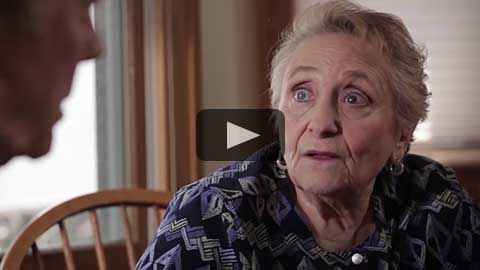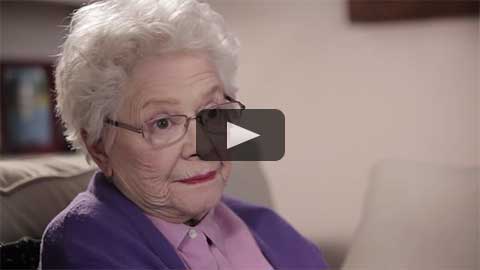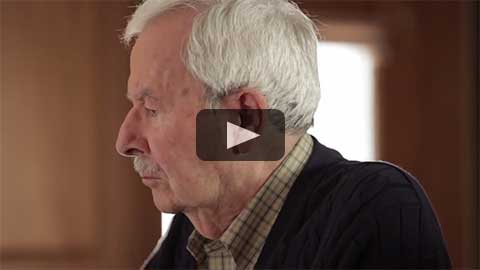Person With Dementia Continues to Drive
Driving requires the ability to react quickly to a variety of circumstances. Because of this, a person living with Alzheimer's will, at some point, be unable to drive. Planning ahead can help ease the transition.
Watch how four families deal with different issues related to dementia and driving.




Having the conversation
Plan to discuss how retirement from driving will be handled before it becomes an issue. Be sympathetic as you address the topic because retiring from driving and the perceived loss of independence is difficult for many. It is important to acknowledge a person's feelings and preserve his or her independence, while ensuring the person's safety and the safety of others.
Starting the conversation:
- Initiate a dialogue to express your concerns. Stress the positive and offer alternatives.
- Address resistance while reaffirming your unconditional love and support.
- Appeal to the person's sense of responsibility.
- Ask your physician to advise the person not to drive. Involving your physician in a family conference on driving may be more effective than trying to persuade the person not to drive by yourself. Ask the physician to write a letter or prescription stating that the person with Alzheimer's must not drive. You can then use the document to remind your family member what's been decided.
- Consider an evaluation by an objective third party.
- Understand that this may be the first of many conversations about driving.
When the conversation does not go well:
Some people give up driving easily, but for others this transition can be very difficult. Be prepared for the person to become angry with you, due to the memory and insight issues that are part of Alzheimer's.
- Be patient and firm. Demonstrate understanding and empathy.
- Acknowledge the pain of this change and appeal to the person's desire to act responsibly.
- Ask a respected family authority figure or your attorney to reinforce the message about not driving.
- If the conversation does not go well, do not blame yourself. The disease can impair insight and judgment, making it difficult for people to understand that their driving is no longer safe. Also the disease can cause mood and personality changes that make reactions more pronounced.
- As a last resort, take away the car keys, disable the car or consider selling the car. When you do any of these things, be sure to provide safe, reliable alternative transportation.
Planning ahead
Learn the facts about driving safety
Plan ahead before driving becomes an issue. This provides an opportunity to make choices and maintain independence and safety.
Download
For people in the early stages of Alzheimer's, it is never too soon to plan ahead for how you will get around when you can no longer drive. Putting a plan in place can be an empowering way to make your voice heard.
Tips for planning ahead:
- Remember that each situation is unique. What works for one person may be different from what works for another. You can get the information and support you need from the Alzheimer's Association at 800.272.3900.
- Involve family and close friends in the plan.
- Confront resistance. Empathize with those who are uncomfortable having the conversation and stress the importance of preparing for the future.
- When the person is still in the early stage of Alzheimer's, ask them to sign a driving contract (see page 3) that gives you his or her permission to help them stop driving when the time comes.
Transportation options
Driving is not the only transportation option available. There are many options people can explore that will allow them to continue to travel independently and remain in control of their mobility.
- Transition driving responsibilities to others. Arrange for family members and friends to provide transportation.
- Arrange a taxi service.
- Use special transportation services for older adults. Access local resources using our free Community Resource Finder or Eldercare Locator to search for transportation services.
- Reduce the need to drive by having prescription medicines, groceries or meals delivered.
Learn more: National Transportation Resources (PDF)
Signs of unsafe driving
Determining when someone can no longer safely drive requires careful observation by family and caregivers. The following list provides warning signs that it's time to stop driving:
-
Forgetting how to locate familiar places
- Failing to observe traffic signs
- Making slow or poor decisions in traffic
- Driving at an inappropriate speed
- Becoming angry or confused while driving
- Hitting curbs
- Using poor lane control
- Making errors at intersections
- Confusing the brake and gas pedals
- Returning from a routine drive later than usual
- Forgetting the destination you are driving to during the trip
Driving evaluation
At the earliest stages, a person with Alzheimer's disease may begin to have difficulty with complex tasks such as driving. Although family and caregivers can watch for signs of unsafe driving, a proactive strategy would be to get a comprehensive driving evaluation by an occupational therapy driving rehabilitation specialist.
The evaluation provides a more objective understanding of the current impact of the disease on driving capacity and results in a plan of options. The goal is always to retain the highest level of independence and mobility in the community. Initial recommendations may include strategies to reduce driving risk during the early part of the disease.
The occupational therapist can offer strategies specific to the individual's goals and needs. The American Occupational Therapy Association website includes a national database of driving specialists as well as a wealth of resources for both persons with Alzheimer's disease and their families.
Learn More
The videos and some of the information on this page are the product of a cooperative agreement between the Alzheimer's Association and the National Highway Traffic Safety Administration (NHTSA).
Source: https://www.alz.org/help-support/caregiving/safety/dementia-driving
0 Response to "Person With Dementia Continues to Drive"
Post a Comment